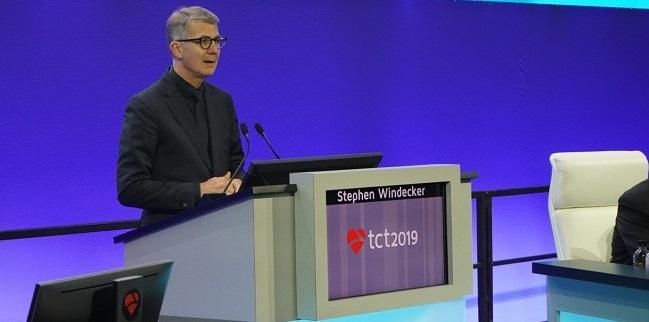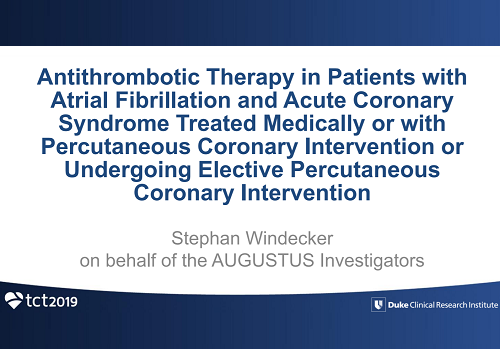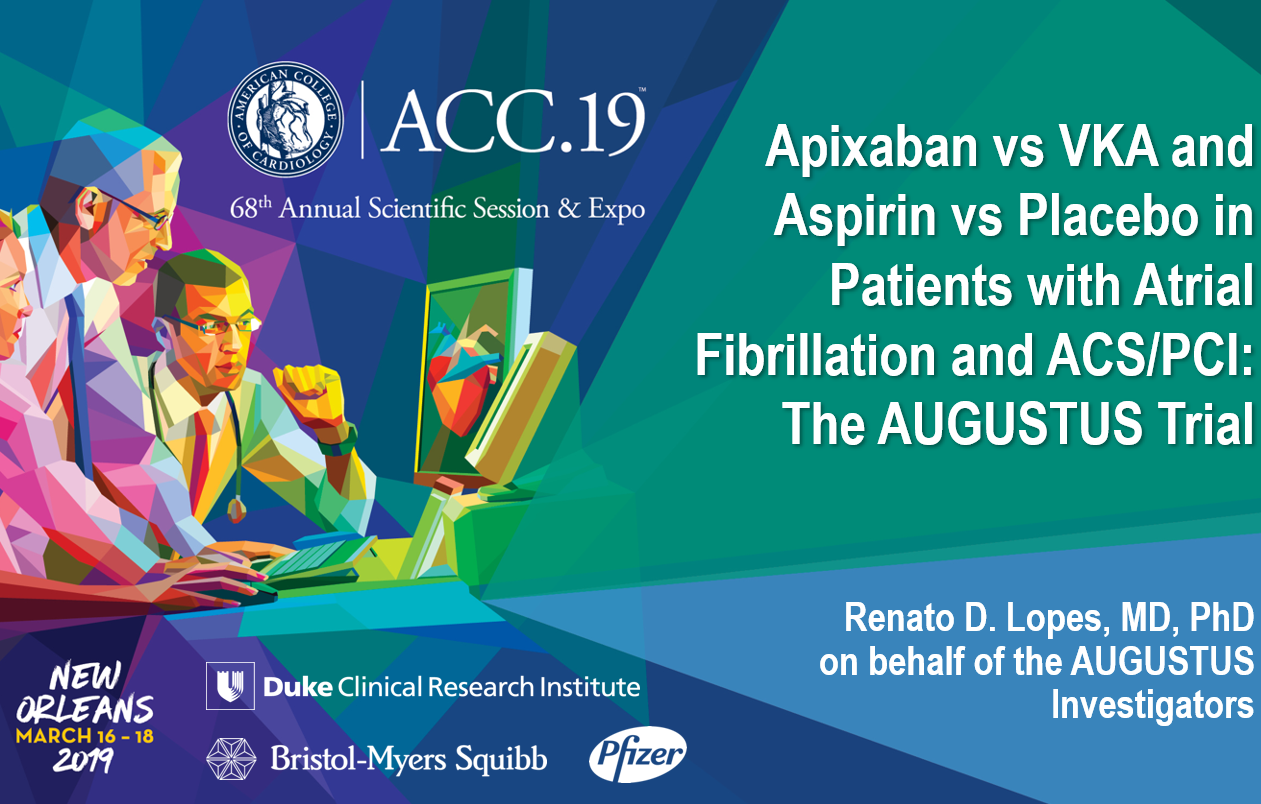AUGUSTUS: Apixaban-Based Dual Therapy Best Across Major Subgroups
Questions about when to drop aspirin in A-fib patients with indications for both DAPT and anticoagulation linger, however.

Apixaban-based dual therapy was beneficial in ACS patients who were treated medically, ACS patients who underwent PCI, and patients undergoing elective PCI for stable coronary disease, Stephan Windecker, MD (Bern University Hospital, Switzerland), presented here at TCT 2019. The addition of aspirin increased major bleeding without having a significant effect on ischemic outcomes.
“The overall results indicate that AUGUSTUS is consistent across the three clinically important subgroups,” Windecker said at a press conference. So, he concluded, “anticoagulation with apixaban at the dose approved for stroke prevention in patients with atrial fibrillation, combined with a P2Y12 inhibitor without aspirin, should be the preferred treatment strategy in patients with atrial fibrillation and acute coronary syndrome, irrespective of whether they are treated medically or undergo PCI, and similarly in those patients who undergo elective PCI.”
Commenting for TCTMD, American College of Cardiology spokesperson B. Hadley Wilson, MD (Sanger Heart & Vascular Institute, Charlotte, NC), said the study “is really confirmatory about what we would call dual therapy being superior to triple therapy in patients who have a reason for anticoagulation, most likely atrial fibrillation, and then also have coronary disease and require a procedure.”

Wilson said this is an important area of research because many patients undergoing PCI require chronic anticoagulation. And, he commented, this analysis “really adds to the body of data in this area that NOACs and a P2Y12 inhibitor is the way to go in these patients.”
Balancing Safety and Efficacy
When a patient who has both an indication for chronic oral anticoagulation (often A-fib) and an indication for dual antiplatelet therapy (often stenting), it creates a situation in which triple antithrombotic therapy may be used. That, however, comes at the cost of increased bleeding, so researchers and clinicians have been searching for regimens that improve safety without compromising on efficacy.
Investigators have now evaluated all four commercially available DOACs in A-fib patients who are undergoing PCI in randomized trials—apixaban (Eliquis; Bristol-Myers Squibb) in AUGUSTUS, dabigatran (Pradaxa; Boehringer Ingelheim) in RE-DUAL PCI, edoxaban (Savaysa; Daiichi Sankyo) in ENTRUST-AF PCI, and rivaroxaban (Xarelto; Bayer/Janssen) in PIONEER AF-PCI. All have provided support for regimens that include a DOAC plus a P2Y12 inhibitor without aspirin, an approach that has been recommended in international consensus statements.

In this new analysis of the trial, published simultaneously online in Circulation, with lead author Renato Lopes, MD, PhD (Duke Clinical Research Institute, Durham, NC), the investigators explored whether those results were consistent regardless of why patients were included.
Of the 4,614 patients enrolled in the trial, 38.8% were undergoing elective PCI for stable coronary disease, 37.3% were undergoing PCI for ACS, and 23.9% were receiving medical therapy alone for ACS.
Compared with a VKA, apixaban reduced ISTH major or clinically relevant nonmajor bleeding at 6 months across those subgroups (P = 0.052 for interaction). Likewise, the benefits of apixaban in terms of death/hospitalization at 6 months were consistent across groups (P = 0.345 for interaction).
Six-Month Outcomes With Apixaban Versus VKA
|
|
Apixaban |
VKA |
HR (95% CI) |
|
ISTH Major or CRNM Bleeding ACS Medical ACS PCI Elective PCI |
5.3% 10.7% 13.7% |
11.5% 15.0% 16.3% |
0.44 (0.28-0.68) 0.68 (0.52-0.89) 0.82 (0.64-1.04) |
|
Death/Hospitalization ACS Medical ACS PCI Elective PCI |
17.7% 26.2% 24.5% |
24.4% 28.8% 27.6% |
0.71 (0.54-0.92) 0.88 (0.74-1.06) 0.87 (0.72-1.04) |
Abbreviation: CRNM, clinically relevant nonmajor.
As in the overall trial, apixaban did not have a significant advantage over VKA in terms of death/ischemic events (MI, stroke, stent thrombosis, or urgent revascularization) in any subgroup (P = 0.356 for interaction).
Across groups, aspirin carried a higher rate of ISTH major or clinically relevant nonmajor bleeding (HRs ranging from 1.49 to 2.02) without having any positive impact on death/hospitalization (P = 0.787 for interaction) or death/ischemic events (P = 0.710 for interaction).
In each of the three subgroups, the rate of ISTH major or clinically relevant nonmajor bleeding was lowest in patients receiving apixaban plus placebo and highest in those receiving a VKA plus aspirin. Death/hospitalization tended to follow the same pattern.
When to Stop Aspirin
The authors note in their paper that there were numerically lower rates of stent thrombosis and MI with aspirin versus placebo in the two PCI subgroups, but that those were “offset by the higher risk of bleeding without net difference in terms of all-cause death.”
Nevertheless, the difference in stent thrombosis in particular sparked a discussion during the press conference as to when aspirin should be stopped after PCI, moving from triple to double antithrombotic therapy in patients who also require chronic anticoagulation.
Windecker said AUGUSTUS showed that extended aspirin therapy out to 6 months is harmful but acknowledged that the optimal duration of short-term aspirin use remains unknown.
Referring to the DOAC trials in the setting of A-fib and PCI, Robert Harrington, MD (Stanford University, CA), a member of the data and safety monitoring board (DSMB) for AUGUSTUS, said “what’s been disappointing is that none of the trials have been big enough to really uncouple the bleeding versus ischemic issue.” He noted that the question about bleeding was answered early on in AUGUSTUS, leading to a debate among the members of the DSMB about whether to let the trial continue. There was concern about the trade-off between bleeding and ischemic risks, Harrington said, pointing out that there were 21 cases of stent thrombosis in the placebo group and 11 in the aspirin group.
“I think you’re spot on, which is we don’t the know answer for how long do you need the triple therapy versus when you can switch to the double therapy,” Harrington said.
That sets up the next major research questions, Windecker said: “We know triple therapy is not the way to go, but we need to fine-tune and probably individualize which patients may benefit from a certain duration of aspirin.”
Windecker said more information will be coming from an AUGUSTUS substudy focused on stent thrombosis, which will be presented in November at the American Heart Association Scientific Sessions in Philadelphia, PA.
Todd Neale is the Associate News Editor for TCTMD and a Senior Medical Journalist. He got his start in journalism at …
Read Full BioSources
Lopes R, Windecker S, Massaro T, et al. Antithrombotic therapy in patients with atrial fibrillation and acute coronary syndrome treated medically or with percutaneous coronary intervention or undergoing elective percutaneous coronary intervention: insights from the AUGUSTUS trial. Circulation. 2019;Epub ahead of print.
Disclosures
- AUGUSTUS was funded by Bristol-Myers Squibb and Pfizer.
- Windecker reports receiving institutional research and educational grants from Abbott, Amgen, Bayer, BMS, CSL Behring, Boston Scientific, Biotronik, Edwards Lifesciences, Medtronic, Polares, and Sinomed.
- Lopes reports receiving research grants from Bristol-Myers Squibb, Pfizer, Amgen, GlaxoSmithKline, Medtronic, and Sanofi Aventis; and consulting fees from Bristol-Myers Squibb, Pfizer, Boehringer Ingelheim, and Bayer AG.
- Wilson reports no relevant conflicts of interest.


Comments